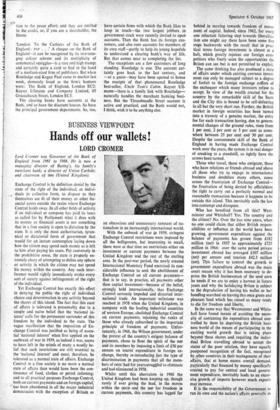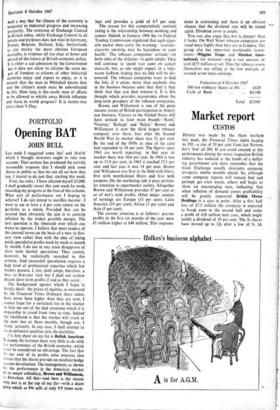Hands off our wallets!
BUSINESS VIEWPOINT LORD CROMER
Lord Cromer was Governor of the Bank of England from 1961 to 1966. He is now a managing director of Baring's, his family's merchant bank; a director of Union Carbide; and chairman of tem (United Kingdom).
Exchange Control is by definition denial by the state of the right of the individual, or indivi- , duals in collective form, to dispose as they themselves see fit of their money or other fin- ancial assets outside the realm where Exchange Control holds sway. In all other fields of activity if an individual or company has paid its taxes as called for by Parliament what it does with its money or financial assets is not something that in a free society is open to dictation by the state. It is only the most authoritarian, tyran- nical or dictatorial form of government that would for an instant contemplate laying down how the citizen may spend such money as is left to him after paying his taxes. Put conversely in the prohibitive sense, the state is properly ex- tremely chary of attempting to define any sphere or activity in which the citizen may not spend his money within the country. Any such inter- ference would rightly immediately evoke every sort of outcry against infringement of the right of the individual.
Yet Exchange Control has exactly this effect in denying the public • the right of individual choice and determination in any activity beyond the shores of this island. The fact that this state of affairs is tolerated is presumably due to a simple and naive belief that the `national in- terest' calls for the permanent surrender of this freedom by the individual to the state. The vague recollection that the imposition of Ex- change Control was justified as being of essen- tial `national interest' when first applied on the outbreak of war in 1939, as indeed it was, seems to have left in the minds of many a woolly be- lief that such restrictions are still essential to the `national interest' and must, therefore, be tolerated as a normal state of affairs. Exchange Control in a free society is no more a normal state of affairs than would have been the con- tinuance of food, clothes or petrol rationing; and to all practical purposes Exchange Control, both on current payments and on foreign capital, has been abandoned in all the major industrial democracies with the exception of Britain as an obnoxious and unnecessary remnant of na- tionalism in an increasingly international world.
With the oubreak of war in 1939, stringent Exchange Control restrictions were imposed by all the belligerents, but interesting to recall, there were at that time no restrictions either on investment or current payments between the United Kingdom and the rest of the sterling area. In the post-war period, the newly created International Monetary Fund exercised its con- siderable influence to seek the abolishment of Exchange Control on all current payments— that is to say, in practice, all payments other than capital investment—because of the belief, strongly held internationally, that Exchange Control seriously impeded and distorted inter- national trade. An important milestone was reached in 1958 when the United Kingdom, in company with the leading industrial countries of western Europe, abolished Exchange Control on current payments, rejoining the ranks of those who already subscribed to the important principle of freedom of payments. Unfor- tunately, in 1966, the Wilson government, under the pretext of the country's exigent balance of payments, chose to flout the spirit of the turn and its members by imposing a limit of £50 per annum on tourist expenditure in foreign ex- change, thereby re-introducing just the type of discrimination in payments that all the mem- bers of OEEC had for years struggled to eliminate and had eliminated in 1958.
Whilst until this aberration in 1966 the United Kingdom had been keeping up, though rarely if ever giving the lead, in the moves within the OECD and the mw for freedom in current payments, this country has lagged far
behind in moving towards freedom of move- ment of capital. Indeed, since 1962, for every one reluctant faltering step towards liberalisa- tion one might say there have been some five steps backwards with the result that in prac- tical terms foreign investment is almost at a halt, which greatly rejoices our foreign com- petitors who freely seize the opportunities the Briton can see but is not permitted to exploit.
The same thinking has also produced a state of affairs under which existing overseas invest- ment can only be managed subject to a degree of forfeit to the foreign exchange coffers of the exchequer which many investors refuse to accept. In view of the wealth created for the country by the remarkable skill of the Scots and the City this is bound to be self-defeating in all but the very short run. Further, the British market in foreign securities has been turned into a travesty of a genuine market, the entry fee for each transaction having, due to govern- mental changes of the ground rules, risen from 1 per cent, 2 per cent or 3 per cent to some- where between 25 per cent and 30 per cent. Despite the consummate skill of the Bank of England in having made Exchange Control work over the years, the system is in real danger of creaking to a standstill, so tightly have the screws been turned.
Those who travel, those who emigrate, those who have relations or friends abroad and above all those who try to engage in international business and doubtless many others, come across the frustration of Exchange Control— the frustration of being denied by officialdom the right to carry out a perfectly normal and reasonable transaction because it happens to be outside this island. This inevitably calls the law into contempt and disrepute.
Who has benefited from all this? West- minster and Whitehall? Yes. The country and the citizen? No. Over the last nine years, when no one could claim that either British respon- sibilities or influence in the world have been growing, government expenditure against the balance of payments has grown from £182 million (net) in 1957 to approximately £725 million in 1966: over the same period private investment abroad has averaged £107 million (net) per annum and tourism £42.3 million (net). This failure to control the growth in government expenditure abroad was the main overt reason why it has been necessary to de- prive the British businessman of the seed corn he needs if we are to enjoy a harvest in future years and why the holidaying Briton is subject to the degradation of having his wallet or her handbag searched on leaving. this once green and pleasant land which has raised so many ready to die for freedom and liberty.
In the same way that Westminster and White- hall have found means of avoiding the neces- sity of containing the expenditure abroad con- trolled by them by depriving the British busi- ness world of the means of participating in the exciting world growth that is taking place beyond these shores and requiring the indivi- dual Briton travelling abroad to accept the status of the poor relation, they have equally postponed recognition of the fact, recognised by other countries in their management of their affairs, that at home excess overall demand, particularly that financed by money specifically created to pay for central and local govern- ment expenditure, inevitably leads to an exces- sive growth of imports however much exports may increase.
It is the responsibility of the Gdvernment to run its own and the nation's affairs generally in
such a way that the climate of the economy is congenial to industrial progress and increasing prosperity. The existence of Exchange Control in Britain today, whilst Exchange Control to all intents and purposes does not exist in Germany, France, Belgium, Holland, Italy, Switzerland, to cite merely the more obvious European examples, is evidence all too clear at home and abroad of the failure of British economic policy. It is either a sad admission by the Government that it dare not allow its citizens the same de- gree of freedom as citizens of other industrial countries enjoy and expect to enjoy, or it is conceit that the man in Whitehall knows best and the citizen's needs must be subordinated to this. How long is this costly state of affairs to be allowed to whittle away British influence and share in world progress? It is twenty-two years since V-Day.



































 Previous page
Previous page